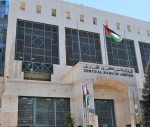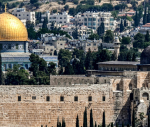You are here
Israel loves walls
Feb 14,2018 - Last updated at Feb 14,2018
Israel loves walls. Last week, it began constructing a concrete slab wall along the ceasefire line with Lebanon, although Beirut charges that the structure encroaches on Lebanon's territory and amounts to "aggression" on Lebanon's sovereignty. The government argues the new wall will stand on Lebanese land placed on the Israeli side of the Blue Line demarcated by the UN after Israel withdrew its troops and surrogate militiamen from south Lebanon in 2000.
This is not the first wall Israel is building on the Lebanese armistice line. In 2012, Israel raised a seven-metre high, 1,200-metre long wall near the town of Metullah. Until the wall intervened Lebanese tourists and activists visiting Kafr Kila used to gather along the fence separating the two countries to shout insults and throw stones at Israeli troops on patrol and workers cultivating crops.
Israel has recognised borders with Egypt and Jordan due to the peace agreements reached with these countries in 1979 and 1996, but ceasefire lines separate Israel from Lebanon and Syria which remain at war with Israel. Beirut argues Israel is illegally occupying tracts of Lebanese territory allocated to Lebanon by Britain and France in 1922-23 when they fixed the borders of Palestine and Syria. Israel has occupied and colonised Syria's Golan Heights since 1967.
In September 2016, Prime Minister Binyamin Netanyahu was asked by a journalist from the Israeli daily Haaretz, if he plans to build barriers around the whole country. "Will we surround all of the State of Israel with fences and barriers? The answer is yes. In the areas that we live in, we must defend ourselves against the wild beasts," he said. At that time, Israel was constructing a barrier designed to stretch along the border with Jordan.
Netanyahu was simply echoing the words of Vladimir Jabotinsky, the Zionist ideologue, who wrote in 1923 that Palestinians would never accept a Jewish majority in Palestine and "Zionist colonisation must either stop, or else proceed regardless of the native population. Which means that it can proceed and develop only under the protection of a power that is independent of the native population — behind an iron wall, which the native population cannot breach."
Founder of the revisionist movement calling upon the Zionist organisation to establish Israel on both banks of the Jordan River, Jabotinsky became the ideologue of the Herut Party, the precursor of the Likud bloc to which Netanyahu belongs. Jabotinsky lived in New York where Benzion Netanyahu, a stalwart of the revisionist movement, served as his secretary. Benjamin Netanyahu is the son of Benzion Netanyahu who died in Israel in 2012.
Benjamin Netanyahu said the billion-dollar wall projects would also include closing certain sections in the West Bank wall-and-fence complex. Israel has extended its security barriers along the border with Egypt, surrounded Gaza with a security fence, and constructed a wall along the armistice line, dividing Israel from Syria. It is significant that Israel built its barrier around Gaza in 1994 after signing the Oslo Accords, which should have brought about the creation of a Palestinian state in East Jerusalem, the West Bank and Gaza, and heralded peace between the Palestinians and Israel. By fencing off Gaza, Israel revealed it had no intention of meeting Palestinian expectations from the Oslo process and would continue to battle the Palestinians and the Arab world.
Israel's West Bank wall-and-fence complex is deemed a "separation barrier" by Israel and an "apartheid wall" by Palestinians. Fifteen per cent of the barrier, 708 kilometres long on completion, stretches along the old Green Line that divided Israel within the 1948 armistice line from the West Bank, governed by Jordan from 1948-67, but the other 85 per cent of the barrier reaches deep into the West Bank. It not only constitutes a land grab, but also isolates Palestinian cities, towns and villages, and prevents the free move-
ment of Palestinians and goods.
While the US has used its veto in the UN Security Council to protect Israel from censure over the West Bank barrier, in 2004 the International Court of Justice issued an advisory opinion stating, "Israel cannot rely on a right of self-defence or a state of necessity in order to preclude the wrongfulness of the construction of the wall." The court concluded, "..the construction of the wall, and its associated regime, are contrary to international law." The court said the barrier should be removed, Palestinians should be compensated for damages and other states should ensure Israel's compliance with the Fourth Geneva Convention, which bans occupying powers from seizing and settling its citizens in occupied territory.
A "Beiruti" commenting on Israel's latest wall on Naharnet, wrote, "In Poland [before World War II] the Jewish people lived in a ghetto, of the Poles' making. Now the Jewish people of Israel are building walls again, apparently the only security they can find is behind a wall, rather than by getting along with their neighbours. The Right Wing Israelis are turning their country into a ghetto. They are not walling Palestinians and Lebanese out as much as they are walling themselves in."
All this wall building could have been avoided if Israel had embraced the Arab League proposal for peace issued by the 2002 summit in Beirut. The League proposed full normalisation with Israel in exchange for full Israeli withdrawal from Arab territory occupied by Israel in 1967. Israel did not only spurn the offer but promptly invad the West Bank in response to an attack by Palestinians on an Israeli coastal town. The then Israeli prime minister was the Likud's Ariel Sharon whose counter-proposal was "peace for peace" rather than "land for peace." By the time he sent his troops into the West Bank, Sharon had built the first sections of the illegal wall.












